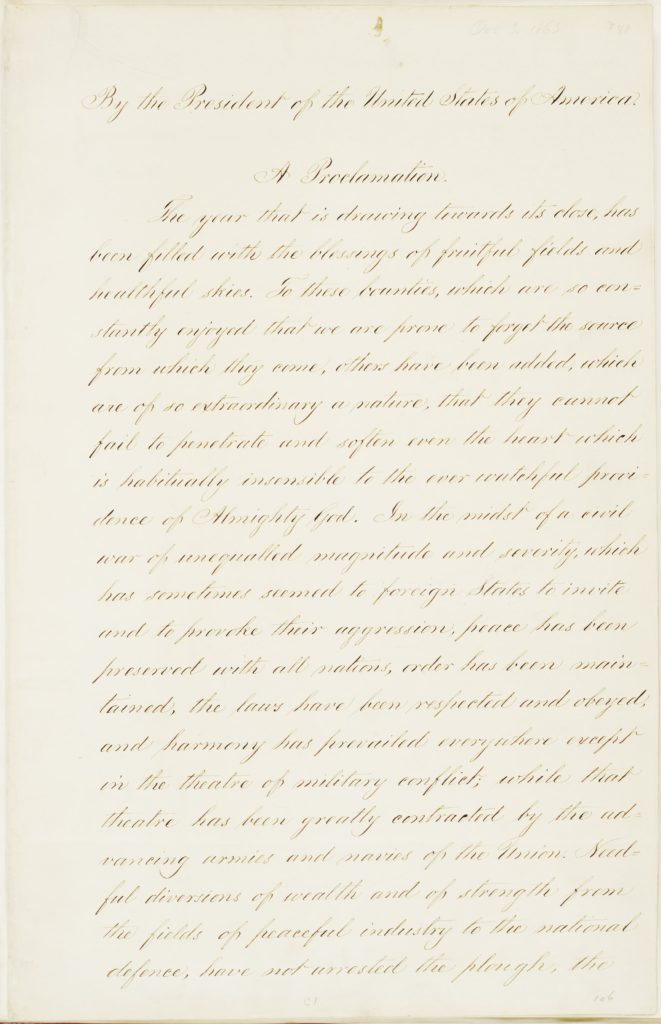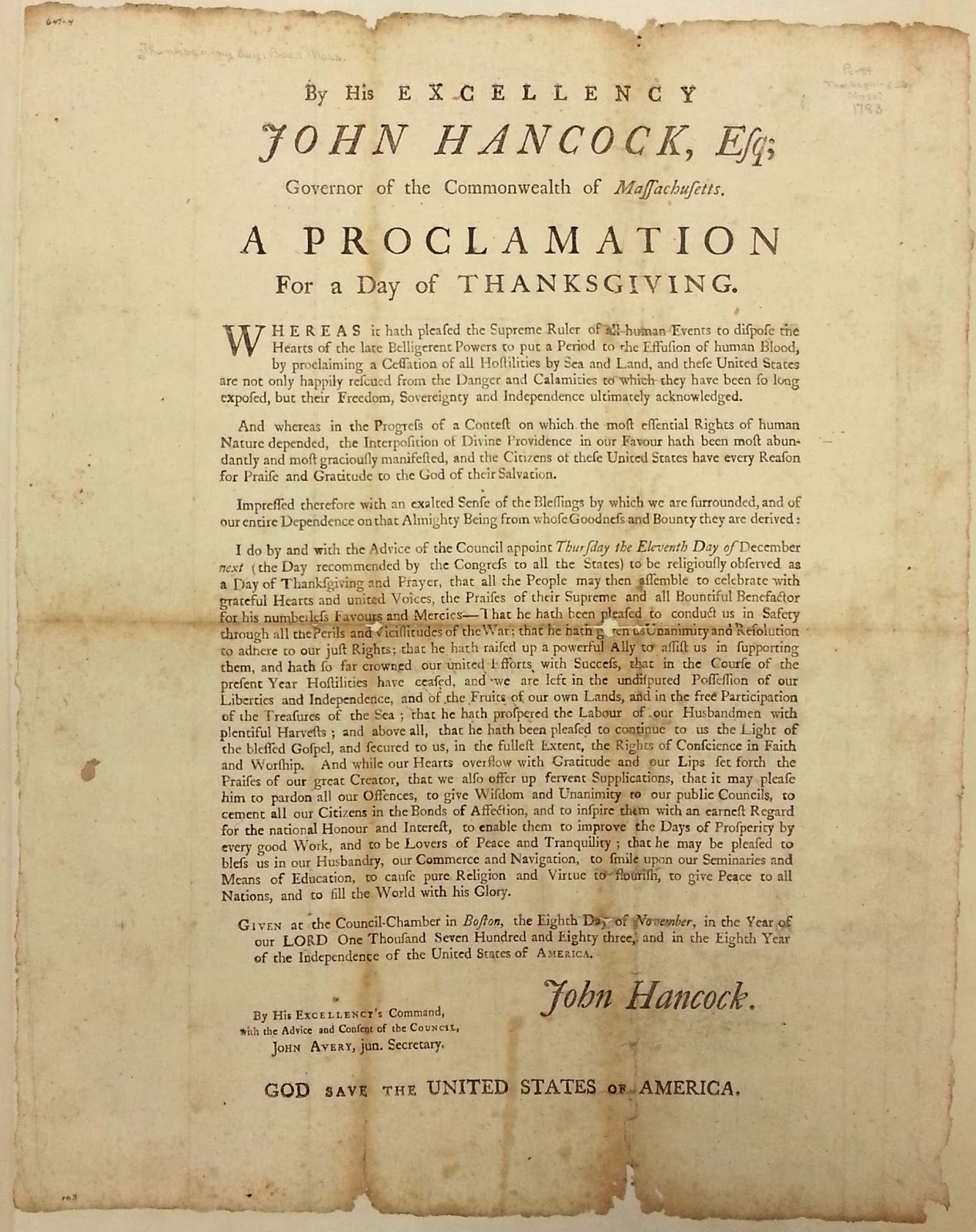Posts
On this day in 1836, James Madison, the two-term fourth president of the United States dies at age 85.
Madison, along with Alexander Hamilton, was a primary author of the Federalist Papers. In addition, he was a key drafter of the Constitution and Bill of Rights, the recorder of the Constitutional Convention. As a result, James Madison is known as the “Father of the Constitution.”
For all these towering achievements, Madison stood at just 5’4″ tall. That’s Our kind of guy.
Greater obligations
James Madison echoed the sentiment of the George Washington quote which inspired our George Washington shirt with this quote from his Proclamation 20 – Recommending a Day of Public Thanksgiving for Peace from March 4, 1815:
“No people ought to feel greater obligations to celebrate the goodness of the Great Disposer of Events and of the Destiny of Nations than the people of the United States.”

On this day in 1863, President Abraham Lincoln issues a Presidential Proclamation inviting the American people “to set apart and observe the last Thursday of November next as a day of thanksgiving.”
The invitation was much like President George Washington’s Proclamation on January 1, 1795 recommending “all persons whomsoever, within the United States, to set apart and observe Thursday, the nineteenth day of February next, as a day of public thanksgiving and prayer.”
The Proclamations are short and rich, so the text of each follows, first Lincoln’s:
“The year that is drawing toward its close has been filled with the blessings of fruitful fields and healthful skies. To these bounties, which are so constantly enjoyed that we are prone to forget the source from which they come, others have been added which are of so extraordinary a nature that they can not fail to penetrate and soften even the heart which is habitually insensible to the ever-watchful providence of Almighty God.
In the midst of a civil war of unequaled magnitude and severity, which has sometimes seemed to foreign states to invite and to provoke their aggression, peace has been preserved with all nations, order has been maintained, the laws have been respected and obeyed, and harmony has prevailed everywhere, except in the theater of military conflict, while that theater has been greatly contracted by the advancing armies and navies of the Union.
Needful diversions of wealth and of strength from the fields of peaceful industry to the national defense have not arrested the plow, the shuttle, or the ship; the ax has enlarged the borders of our settlements, and the mines, as well of iron and coal as of the precious metals, have yielded even more abundantly than heretofore. Population has steadily increased notwithstanding the waste that has been made in the camp, the siege, and the battlefield, and the country, rejoicing in the consciousness of augmented strength and vigor, is permitted to expect continuance of years with large increase of freedom.
No human counsel hath devised nor hath any mortal hand worked out these great things. They are the gracious gifts of the Most High God, who, while dealing with us in anger for our sins, hath nevertheless remembered mercy.
It has seemed to me fit and proper that they should be solemnly, reverently, and gratefully acknowledged, as with one heart and one voice, by the whole American people. I do therefore invite my fellow-citizens in every part of the United States, and also those who are at sea and those who are sojourning in foreign lands, to set apart and observe the last Thursday of November next as a day of thanksgiving and praise to our beneficent Father who dwelleth in the heavens. And I recommend to them that while offering up the ascriptions justly due to Him for such singular deliverances and blessings they do also, with humble penitence for our national perverseness and disobedience, commend to His tender care all those who have become widows, orphans. mourners, or sufferers in the lamentable civil strife in which we are unavoidably engaged, and fervently implore the interposition of the Almighty hand to heal the wounds of the nation and to restore it, as soon as may be consistent with the divine purposes, to the full enjoyment of peace, harmony, tranquillity, and union.
In testimony whereof I have hereunto set my hand and caused the seal of the United States to be affixed.
Done at the city of Washington, this 3d day of October, A. D. 1863, and of the Independence of the United States the eighty-eighth.
ABRAHAM LINCOLN.
By the President:
WILLIAM H. SEWARD, Secretary of State.”

Now, Washington’s:
“When we review the calamities, which afflict so many other nations, the present condition of the United States affords much matter of consolation and satisfaction. Our exemption hitherto from foreign war – an increasing prospect of the continuance of that exemption – the great degree of internal tranquility we have enjoyed – the recent confirmation of that tranquility by the suppression of an insurrection which so wantonly threatened it – the happy course of public affairs in general – the unexampled prosperity of all classes of our citizens; are circumstances which peculiarly mark our situation with indications of the Divine beneficence towards us. In such a state of things it is, in an especial manner, our duty as people, with devout reverence and affectionate gratitude, to acknowledge our many and great obligations to Almighty God and to implore Him to continue and confirm the blessings we experience.
Deeply penetrated with this sentiment, I, George Washington, President of the United States, do recommend to all religious societies and denominations, and to all persons whomsoever, within the United States, to set apart and observe Thursday, the nineteenth day of February next, as a day of public thanksgiving and prayer: and on that day to meet together and render their sincere and hearty thanks to the great Ruler of nations for the manifold and signal mercies which distinguish our lot as a nation. particularly for the possession of constitutions of government which unite and, by their union, establish liberty with order; for the preservation of peace, foreign and domestic; and for the seasonable control, which has been given to a spirit of disorder, in the suppression of the late insurrection; and generally for the prosperous course of our affairs, public and private; and, at the same time, humbly and fervently to beseech the kind Author of these blessings. graciously to prolong them to us – to imprint on our hearts a deep and solemn sense of our obligations to Him for them – to teach us rightly to estimate their immense value – to preserve us from the arrogance of prosperity and from hazarding the advantages we enjoy by delusive pursuits – to dispose us to merit the continuance of His favors by not abusing them, by our gratitude for them, and by a correspondent conduct as citizens and as men – to render this country, more and more, a propitious asylum for the unfortunate of other countries – to extend among us true and useful knowledge – to diffuse and establish habits of sobriety, order, morality, and piety – and, finally, to impart all blessings we possess or ask for ourselves, to the whole family of mankind.
In testimony whereof, I have caused the seal of the United States of America, to be affixed to these presents, and signed the same with my hand. Done, at the city of Philadelphia, the first day of January, 1795, and of the independence of the United States of America, the nineteenth.
Go Washington,
President of the United States
EDMUND RANDOLPH, Secretary of State.”
President George Washington issued the first Thanksgiving Proclamation (pictured below). Then, President Lincoln made it a federal holiday with his 1863 Proclamation. With that, he invited American citizens to “set apart… the last Thursday of November… as a day of Thanksgiving and Praise to our beneficent Father who dwelleth in the Heavens.”
The first presidential Thanksgiving Proclamation
First, here is a portion of the Thanksgiving Proclamation Issued by President George Washington on October 3, 1789:
“It is the duty of all nations to acknowledge the providence of Almighty God, to obey His will, to be grateful for His benefits, and humbly to implore His protection and favor; and… to the people of the United States a day of public thanksgiving and prayer, to be observed by acknowledging with grateful hearts the many and signal favors of Almighty God…Now, therefore, I do recommend and assign [the last] Thursday… of November… to be devoted by the people of these States to the service of that great and glorious Being who is the beneficent author of all the good that was, that is, or that will be; that we may then all unite in rendering unto Him our sincere and humble thanks for His kind care and protection… .”
“Inestimable blessings”
Next, this is an excerpt from President Abraham Lincoln’s Thanksgiving Day Proclamation, dated October 20, 1864:
Now, therefore, I, Abraham Lincoln, President of the United States, do hereby appoint and set apart the last Thursday in November… as a day which I desire to be observed by all my fellow-citizens, wherever they may then be, as a day of thanksgiving and praise to Almighty God, the beneficent Creator and Ruler of the Universe. And I do further recommend to my fellow-citizens aforesaid that on that occasion they do reverently humble themselves in the dust and from thence offer up penitent and fervent prayers and supplications to the Great Disposer of Events for a return of the inestimable blessings of peace, union, and harmony throughout the land which it has pleased Him to assign as a dwelling place for ourselves and for our posterity throughout all generations.”
Finally, here is the first verse from “The President’s Hymn” written by William Augustus Muhlenburg for President Lincoln in 1863:
Give thanks, all ye people, give thanks to the Lord,
Alleluias of freedom with joyful accord:
Let the East and the West, North and South roll along,
Sea, mountain and prairie, one thanksgiving song.






